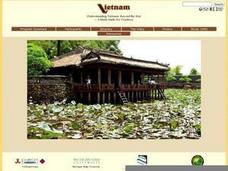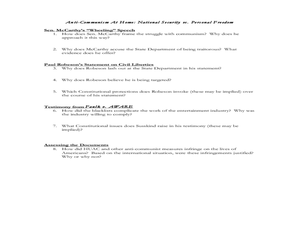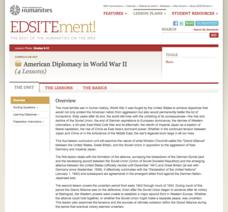Curated OER
A Brief History of Vietnam (1858-2004) and Its Evolving Communist System
Students examine the French colonization of Vietnam, the Vietnam War, and the current evolving Communist system. They develop political maps, outline the major events of the Vietnam War, write an essay, and compare/contrast democracy...
Curated OER
The Cold War: Anti-Communism at Home
Eleventh graders take a closer look at the Red Scare. In this Cold War lesson plan, 11th graders read the provided literature about anti-communism in the United States and then respond to the provided discussion questions that accompany...
Curated OER
Social Studies Test B-Grade 5
In this grade 5 social studies test worksheet, 5th graders complete a 30 question multiple choice quiz covering a variety of grade 5 concepts.
Curated OER
Tiananmen Square
Students identify and explain the Tiananmen Square incident of June 1989.
Studentsl compare what it is to be an American Citizen (Democracy) vs.
Chinese Citizen (Communism). Students identify and define various vocabulary terms,...
Curated OER
The Russian Years: Back in the USSR
Students examine communist Russia. In this lesson on changes in politics, students work in small groups to compare and contrast soviet communist era citizen rights to those of the US. They participate in discussion of a film and create a...
Curated OER
Follow the Marx
Students explore communism from historical and theoretical perspectives to present to fellow classmates at a teach-in. Each team of students be responsible for researching and presenting on one of the suggested topics in the lesson.
Curated OER
The Chinese economic and political model.
Ninth graders study the unique and economic and political model of modern day People's Republic of China. They make an effort to determine if the unique brand of socialism with a market-type economy as currently practiced is ...
Curated OER
Why Communism Failed
In this Why Communism Failed worksheet, learners read an account from a Russian citizen (primary source) then write short answer responses to five questions.
Carolina K-12
Joe McCarthy and the Red Scare
In the 1950s, how did the Red Scare and the actions of Senator Joseph McCarthy affect the American people? Your young historians will analyze primary source documents on the Red Scare, participate in a "find the Communist" simulation,...
New York State Education Department
Global History and Geography Examination: January 2011
Using primary and secondary sources—including classics such as the Communist Manifesto—class members consider the effects of these ideas on the course of history. Another essay prompt explores geography and history, while multiple-choice...
National Endowment for the Humanities
Soviet Espionage in America
The war against Communism and Joseph McCarthy’s place in it are the focus of a series of three lessons examining postwar America from 1945-1950. This first lesson plan asks groups to read an introduction that describes the Verona Project...
National First Ladies' Library
Safety or Civil Liberty? The Trial of Sacco and Vanzet
Students investigate the Sacco-Vanzetti trial and develop a basic understanding of the issues involved. Then they write an essay taking a stance on the Sacco-Vanzetti trial: was the trial fair? were the two men falsely accused? Finally,...
Curated OER
Restructuring the Post War World: 1945-Present
You have just entered the Cold War Zone, with 96 slides at your disposal. From changes in government in China, The Marshall Plan, and the Iron Curtain, to the Vietnam War and Ronald Regan, this presentation will help you cover it all. A...
National Endowment for the Humanities
American Diplocmacy in World War II
The end of World War II saw the world deeply changed over the last few years. Four thorough lessons explore post-war Europe, America, and Asia through reading assignments and discussion questions about the Grand Alliance and the signing...
Historical Thinking Matters
Spanish-American War: 3 Day Lesson
Why did the United States choose to invade Cuba in 1898? As part of a 3-day lesson plan, your young historians will first develop working hypotheses to answer this question, then work with a variety of historical primary source documents...
Annenberg Foundation
Becoming Visible
The television and interstate highways both came of age in 1950s America. Scholars use film, text, and discussion to explore how these and other cultural icons shaped the literature of the time. Pupils also create a family history...
Curated OER
The Cold War (1945-1991): An Ideological Struggle
Covering the main topics of the Cold War, including some excellent discussion points on the methodologies of the Soviet and Eastern Bloc nations versus the US and Western Democracies, this presentation is a good way to introduce the...
Curated OER
World War II - War Comes to Hawaii
Ninth graders use geographic representations to organize, analyze, and present information on people, places, and environments. They use tools and methods of geographers to construct, interpret, and evaluate qualitative and quantitative...
North Carolina School of Science and Mathematics
Henry Kissinger and Detente
How did relations between the United States and the People's Republic of China evolve between 1950 and 1970? Your young historians will complete a timeline of events with evidence that the relationship between these two great nations was...
Curated OER
Imperialism in China
China has been through many changes over the last two centuries. This slideshow takes a look at the effects imperialism and European contact had on Chinese government. Images, well-organized information, and a complete outline make this...
PBS
The Sixties: Notes from the Ho Chi Minh Trail
Young historians research the rationales for fighting the Vietnam War, and the controversies surrounding it. They watch film clips, examine photographs, and read Lyndon B. Johnson's message to Congress to gather information for a...
Smithsonian Institution
Korean War
North and South Korea: two regions divided. The story of the Korean War describes the events that occurred when these two regions' ideologies clashed. The resource uses various images and descriptions of artifacts, in addition to...
Roy Rosenzweig Center for History and New Media
End of the Cold War
How significant was the Cold War during the 20th century? After reading and analyzing speeches by Ronald Reagan and Mikhail Gorbachev, learners consider the historical context of foreign policy decisions made during the Cold War by both...
Social Studies School Service
DVD Lesson Plan: Thirteen Days
Here you'll find a fine teacher reference for presenting the film Thirteen Days, a dramatic interpretation of the Cuban Missile Crisis during the Kennedy administration. It includes a brief description of the film, learning objectives, a...
Other popular searches
- Socialism and Communism
- Socialism Communism
- Capitalism Socialism Communism
- Socialism Communism Fascism
- Socialism, Communism, Facism
- Socialism, Communism, Fascism
- Socialism Communism Facism

























